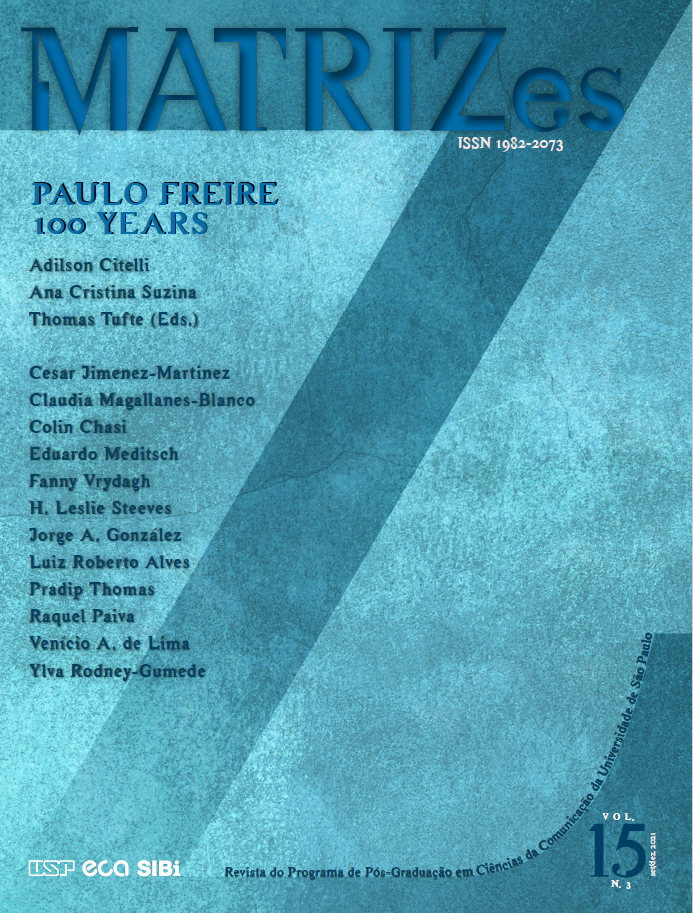Freire, communications and tolerance in India
DOI:
https://doi.org/10.11606/issn.1982-8160.v15i3p203-222Keywords:
Freire, Popular theatre, Digital divide, Tagore, GandhiAbstract
This article explores Freire’s continuing relevance to education and cultural action in India. It engages with the specificities of Freire’s contributions reviewing the work of two key Indian pedagogists, Tagore and Gandhi. It deals with Freirean thought in the specific context of Indian politics characterised by hypernationalism. Drawing from the author’s experiences with the praxis of popular theatre, the article deals with challenges posed by critical education in contemporary India, during a pandemic that has highlighted the lack of access to education and the digital divide. It reinforces the need of understanding context and of an enlightened approach to an education that fosters tolerance as a counter to hypernationalism.
Downloads
References
Banerjee, S. (2019). Indian people’s theatre association. In D. M. Figueira (Ed.), Art and resistance: Studies in Indian theatres (pp. 40-55). Peter Lang.
Basu, T. (2012). Caste matters: Rabindranath Tagore’s engagement with India’s ancient social hierarchies. South Asia: Journal of South Asia Studies, 35(1), 162-171. https://doi.org/10.1080/00856401.2011.648910
Brahma, J., Pavarala, V., & Belavadi, V. (2019). Driving social change through Forum Theatre: A study of Jana Sanskriti in West Bengal, India. Asia Pacific Media Educator, 29(2), 164-177. https://doi.org/10.1177/1326365X19864477
Chatterjee, J. (2016, 6 de fevereiro). The theatre of Badal Sircar. Fountainink. https://bit.ly/2WtgSpD
Coudray, S. (2017, 28 de janeiro), The Theatre of the Oppressed. Culture Matters. https://bit.ly/3DwI1cr
Covid meltdown exposes new front in India’s digital divide. (2021, 21 de abril). Al Jazeera. https://bit.ly/3Dk7wgW
Fonseca, C. (1973). Paulo Freire in Bombay. New Frontiers in Education, 3(2), 92-98.
Freire, P. (2005). Teachers as cultural workers: Letters to those who dare [Professora, sim; tia, não: Cartas a quem ousa ensinar]. Westview Press.
Freire, P. (2014a). Pedagogy of hope: Reliving pedagogy of the oppressed [Pedagogia da esperança]. Bloomsbury.
Freire, P. (2014b). Pedagogy of solidarity [Pedagogia da solidariedade]. In A. M. A. Freire & W. de Oliveira (Eds.), Pedagogy of solidarity:
Paulo Freire, patron of Brazilian education (pp. 15-33). Left Coast Press.
Ganguly, S. (2010). Jana Sanskriti: Fourm Theatre and democracy in India. Routledge.
Ghosh, R. (2019). Juxtaposing the educational ideas of Gandhi and Freire. In C. A. Torres (Ed.), The Wiley handbook of Paulo Freire (pp. 275-290). Wiley-Blackwell.
Ghosh, R., Naseem, M. A., & Vijh, A. (2011). Tagore and education: Gazing beyond the colonial cage. In A. A. Abidi (Ed.), Decolonising philosophies of education (pp. 59-71). Sense. https://doi.org/10.1007/978-94-6091-687-8
Gupta, A. (2021, 11 de janeiro). Pandemic is an opportunity to reimagine schools as places for community learning, The Indian Express. https://bit.ly/2WDGr7O
Jain, J. (2019). Badal Sircar’s journey towards the Third Theatre. In D. M. Figueira (Ed.), Art and resistance: Studies in Indian theatres (pp. 174-192). Peter Lang.
Jana, J. (2020, 6 de agosto). Bapu’s Nai Talim. The Statesman. https://bit.ly/3ylb5Qc
Jeyraj, J. J. (2021, 21 de abril). Critical pedagogy in emergency remote teaching: An open letter to Paulo Freire. ASCILITE Technology Enhanced Learning Blog. https://bit.ly/3zxtZVw
Jha, R., & Sanyal, S. (2019). Use of Theatre of the Oppressed in community development: A case study of Jana Sanskriti Ngo, West Bengal. Social Work Chronicle, 8(1), 105-112. https://bit.ly/3mTAEFY
Kidd, R. (1985). Popular theatre and nonformal education in the Third World: Five strands of experience. International Review of Education, 30, 265-287. https://doi.org/10.1007/BF00597905
Mandal. S. (2019). The rise of lifelong learning and the fall of adult education in India. London Review of Education, 17(3), 318-330. http://doi.org/10.18546/LRE.17.3.08
Mevawala, Z. (2020). Critical consciousness, social justice and resistance: The experiences of young children living in the streets in India. Peter Lang.
Nath, S. (2012, 9 de julho), Who’s afraid of Augusto Boal. The Indian Express. https://bit.ly/3Btuqka
Pandey, K. (2020, 30 de julho). Covid 19 lockdown highlights India’s great digital divide. Down to Earth. https://bit.ly/38kPxso
Siddartha. (s.d.). Beyond Paulo Freire. https://bit.ly/3mzcQHk
Thakur, P. B. (2013). Theatre for development in Indian context: An introspection. Global Media Journal – Indian Edition, 4(2), 1-12. https://bit.ly/38qnlod
Thomas, P. N. (1987). Communication and development in India: A study of two approaches [Tese de doutorado, University of Leicester]. Repositório da University of Leicester. https://bit.ly/3nqlBUq
Thomas, P. N. (1995). Popular theatre in sickness and in health: Observations from India, In J. Servaes, T. L. Jacobson, & S. A. White (Eds.), Participatory communication for social change (pp. 213-222). Sage.
Waisbord, S. (2020). Why Paulo Freire is a threat for right-wing populism: Lessons for communication of hope. The International Communications Gazette, 82(5), 440-455. https://doi.org/10.1177/1748048520943694
Woods, A. (2020, 2 de julho). Why is the Brazilian right afraid of Paulo Freire. Open Democracy. https://bit.ly/3DvrjKG
Downloads
Published
Issue
Section
License

This work is licensed under a Creative Commons Attribution-NonCommercial-ShareAlike 4.0 International License.
Authors who publish in this journal agree to the following terms:
- Authors retain the copyright and grant the journal the right to first publication, with the work simultaneously licensed under the Creative Commons Attribution License (CC BY-NC-SA 4.0) which allows sharing of the work with acknowledgment of authorship and initial publication in this journal for non-commercial purposes.
- Authors are authorized to assume additional contracts separately, for non-exclusive distribution of the version of the work published in this journal (eg, publishing in institutional repository or as a book chapter), with acknowledgment of authorship and initial publication in this journal.






















